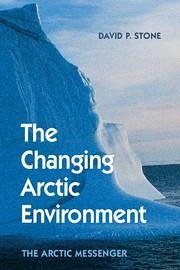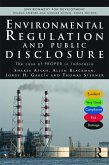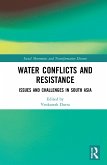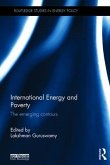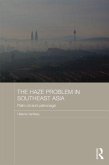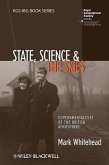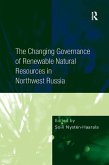- Gebundenes Buch
- Merkliste
- Auf die Merkliste
- Bewerten Bewerten
- Teilen
- Produkt teilen
- Produkterinnerung
- Produkterinnerung
An accessible, engagingly written book on Arctic environmental change and cooperation by an author intimately involved in Arctic science and policy.
Andere Kunden interessierten sich auch für
![Environmental Regulation and Public Disclosure Environmental Regulation and Public Disclosure]() Shakeb AfsahEnvironmental Regulation and Public Disclosure168,99 €
Shakeb AfsahEnvironmental Regulation and Public Disclosure168,99 €![Water Conflicts and Resistance Water Conflicts and Resistance]() Water Conflicts and Resistance179,99 €
Water Conflicts and Resistance179,99 €![International Energy and Poverty International Energy and Poverty]() International Energy and Poverty179,99 €
International Energy and Poverty179,99 €![Forest Preservation in a Changing Climate Forest Preservation in a Changing Climate]() Sébastien JodoinForest Preservation in a Changing Climate134,99 €
Sébastien JodoinForest Preservation in a Changing Climate134,99 €![The Haze Problem in Southeast Asia The Haze Problem in Southeast Asia]() Helena VarkkeyThe Haze Problem in Southeast Asia179,99 €
Helena VarkkeyThe Haze Problem in Southeast Asia179,99 €![State, Science and the Skies State, Science and the Skies]() Mark WhiteheadState, Science and the Skies103,99 €
Mark WhiteheadState, Science and the Skies103,99 €![The Changing Governance of Renewable Natural Resources in Northwest Russia The Changing Governance of Renewable Natural Resources in Northwest Russia]() Soili Nysten-HaaralaThe Changing Governance of Renewable Natural Resources in Northwest Russia67,99 €
Soili Nysten-HaaralaThe Changing Governance of Renewable Natural Resources in Northwest Russia67,99 €-
-
-
An accessible, engagingly written book on Arctic environmental change and cooperation by an author intimately involved in Arctic science and policy.
Produktdetails
- Produktdetails
- Verlag: European Community
- Seitenzahl: 374
- Erscheinungstermin: 16. Februar 2015
- Englisch
- Abmessung: 231mm x 157mm x 28mm
- Gewicht: 703g
- ISBN-13: 9781107094413
- ISBN-10: 1107094410
- Artikelnr.: 41645614
- Verlag: European Community
- Seitenzahl: 374
- Erscheinungstermin: 16. Februar 2015
- Englisch
- Abmessung: 231mm x 157mm x 28mm
- Gewicht: 703g
- ISBN-13: 9781107094413
- ISBN-10: 1107094410
- Artikelnr.: 41645614
David P. Stone received a degree in zoology from the University of Aberdeen in 1973. In 1977, he earned a PhD in oceanography from the University of British Columbia. Initially, he worked as an oceanographic scientist in the Canadian Arctic. From 1980 to 2004, he was involved in the management of research for the Northern Affairs Programme of the Canadian Government, becoming Director of Northern Science and Contaminant Research. During this time, he became involved in the development of circumpolar cooperation under the Arctic Environmental Protection Strategy that subsequently became the Arctic Council. In 1991 they established the Arctic Monitoring Assessment Programme (AMAP), where he served as Canada's delegate on the governing working group until 2004 and as its chair between 1993 and 1997. From 1990 to 1994, David co-chaired the task force on persistent organic pollutants (POPs) under the UNECE LRTAP Convention and helped develop a legally binding protocol under the convention. He also served on the Canadian delegation that negotiated a parallel protocol on heavy metals, including mercury. He was involved with negotiating the Stockholm Convention on POPs and, after retirement, he was retained by the convention secretariat to assist in the development of a process to measure, through global monitoring, whether environmental levels of POPs are falling as a result of the new international controls. In 1997, he was instrumental in developing a virtual University of the Arctic based on existing circumpolar institutions. The Arctic Council formally announced the creation of the university in September 1998. David received Deputy Minister awards from the Northern Affairs Programme and from Environment Canada, and he also received an award from Jean Chrétien, the then Prime Minister of Canada. These awards were in recognition of his work on developing and managing Arctic contaminants research and on using the results to achieve negotiation of global agreements.
1. Personal beginnings
Part I. The Changing Arctic: 2. The Arctic messenger
Part II. Working Together: 3. The Arctic messenger gains a voice: the Arctic Monitoring and Assessment Programme
Part III. What Is the Present State of Knowledge?: 4. Radioactivity
5. Heroic efforts
6. Acidification and Arctic haze
7. Stratospheric ozone depletion
8. Persistent organic pollutants and heavy metals (including mercury)
9. Conducting marine science in the Arctic
10. Climate change in the Arctic
Part IV. What Does This All Mean?: 11. Thoughts on education, the training of Arctic scientists and Arctic research
12. The long and short of it: has the Arctic message been noticed?
13. Epilogue: keeping the Rovaniemi flame alive.
Part I. The Changing Arctic: 2. The Arctic messenger
Part II. Working Together: 3. The Arctic messenger gains a voice: the Arctic Monitoring and Assessment Programme
Part III. What Is the Present State of Knowledge?: 4. Radioactivity
5. Heroic efforts
6. Acidification and Arctic haze
7. Stratospheric ozone depletion
8. Persistent organic pollutants and heavy metals (including mercury)
9. Conducting marine science in the Arctic
10. Climate change in the Arctic
Part IV. What Does This All Mean?: 11. Thoughts on education, the training of Arctic scientists and Arctic research
12. The long and short of it: has the Arctic message been noticed?
13. Epilogue: keeping the Rovaniemi flame alive.
1. Personal beginnings
Part I. The Changing Arctic: 2. The Arctic messenger
Part II. Working Together: 3. The Arctic messenger gains a voice: the Arctic Monitoring and Assessment Programme
Part III. What Is the Present State of Knowledge?: 4. Radioactivity
5. Heroic efforts
6. Acidification and Arctic haze
7. Stratospheric ozone depletion
8. Persistent organic pollutants and heavy metals (including mercury)
9. Conducting marine science in the Arctic
10. Climate change in the Arctic
Part IV. What Does This All Mean?: 11. Thoughts on education, the training of Arctic scientists and Arctic research
12. The long and short of it: has the Arctic message been noticed?
13. Epilogue: keeping the Rovaniemi flame alive.
Part I. The Changing Arctic: 2. The Arctic messenger
Part II. Working Together: 3. The Arctic messenger gains a voice: the Arctic Monitoring and Assessment Programme
Part III. What Is the Present State of Knowledge?: 4. Radioactivity
5. Heroic efforts
6. Acidification and Arctic haze
7. Stratospheric ozone depletion
8. Persistent organic pollutants and heavy metals (including mercury)
9. Conducting marine science in the Arctic
10. Climate change in the Arctic
Part IV. What Does This All Mean?: 11. Thoughts on education, the training of Arctic scientists and Arctic research
12. The long and short of it: has the Arctic message been noticed?
13. Epilogue: keeping the Rovaniemi flame alive.

